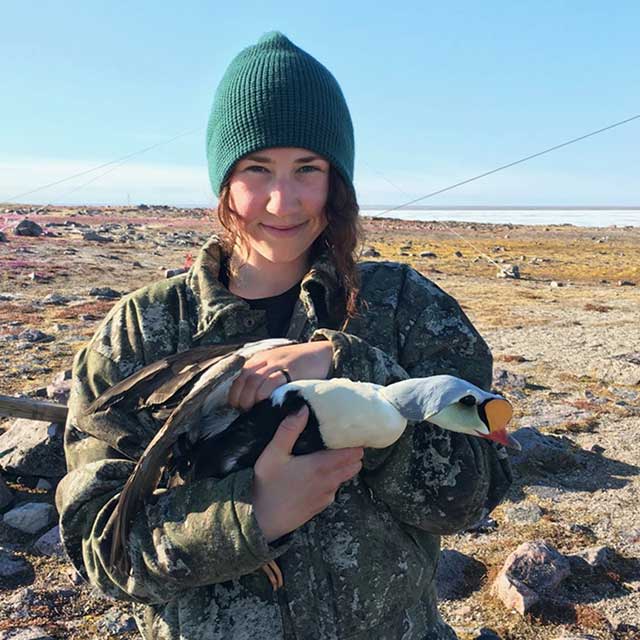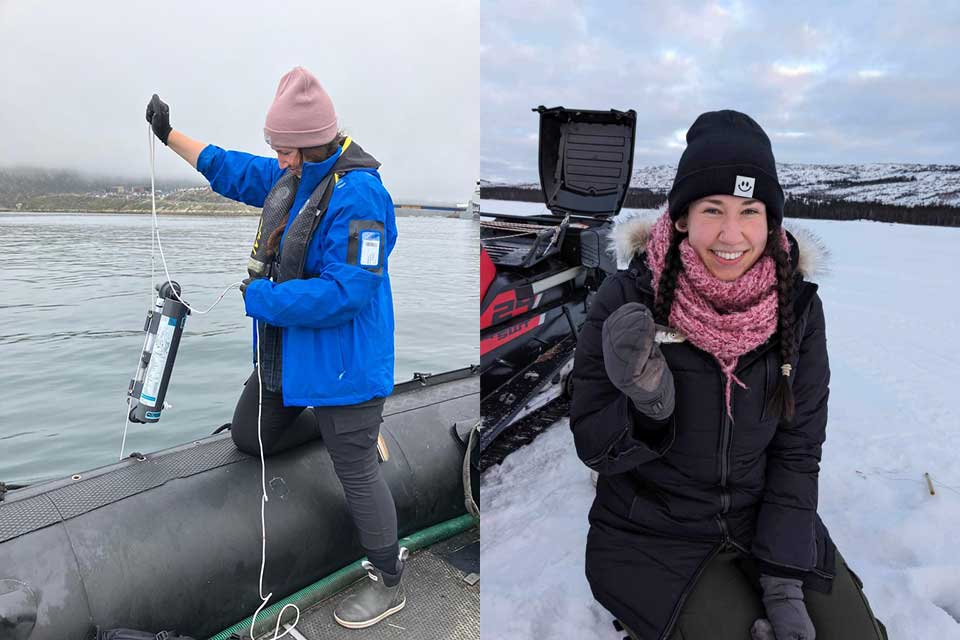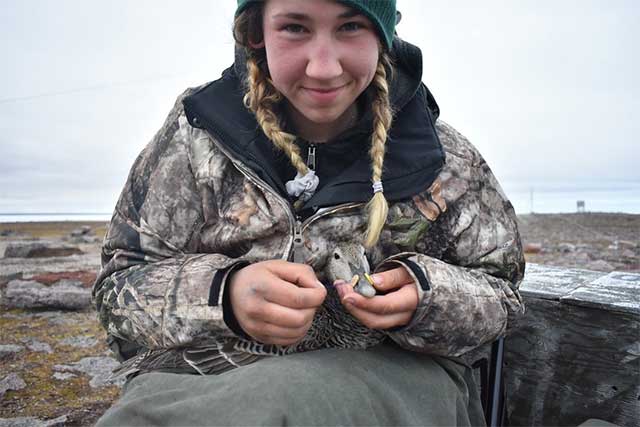
Reyd holding a King Eider.
Reyd Dupuis-Smith, a 2022 SDJV Student Fellowship Awardee, has dedicated her studies to understanding how anthropogenic factors and pollution impact birds of all kinds. She completed her undergraduate studies at the University of Manitoba, graduating with a degree in Biology, where she studied how artificial light alters the spring migration timing of purple martin. After graduating, she began a summer job in Alberta, assisting with monitoring grassland songbirds’ nesting success near oil infrastructure. Her passion for birds drove her to complete a Master’s degree at the University of Windsor, where her research focused on understanding the impacts of cumulative stressors on common eider reproduction and behavior and how mercury levels of different pan-Arctic eider colonies vary with foraging ecology.
Outside of this work, Reyd’s research interests spanning from Arctic invertebrates to fish and marine mammals have brought her on expeditions to places such as the Northwest Passage to collect samples to assist with studies on plastic pollution in the Canadian Arctic and Greenland. As a Red River Métis individual, she is also very passionate about Indigenous-led programs and ensuring research and conservation policies are meaningful to Indigenous communities. She hopes her future work includes a focus on that aspect of conservation.

Reyd while doing water sampling and collecting fish as part of her fieldwork.
She is currently continuing her research in a PhD program at Carleton University. As a student under Dr. Joseph Bennett and Dr. Jennifer Provencher, her work is focused on understanding long-term oil exposure patterns and diet in seabirds in Nunatsiavut, Labrador. Spurred by a diesel spill that occurred in the area, her research aims to determine the long-term and sub-lethal impacts of oil exposure, particularly the polycyclic aromatic compounds (PACs) found in oil on breeding and migratory common eiders and black guillemot.
Many small-scale oil spills are considered not likely to impact wildlife given how quickly the oil dissipates. However, early results of Reyd’s work suggest this is not the case in Nunatsiavut, where she has found elevated levels of PACs in the years post-spill. This has the potential to impact the health of the birds and has implications for oil pollution monitoring programs related to both humans and wildlife in other areas. Right now, the team is focused on distributing this information and expanding the monitoring program in Nunatsiavut, where it is helping inform human consumption guidelines for seabird eggs. All of her research is being done in collaboration with both Environment and Climate Change Canada and the Nunatsiavut Government.

Reyd with a female King eider during her fieldwork.
She received an SDJV Student Fellowship as part of her PhD studies, but she shared that outside of providing much-needed funds for her research, the fellowship allowed her to make professional connections with other sea duck researchers and students. “It’s been a key opportunity to get involved in the sea duck community as a student researcher just starting my career!”, she shared. Plus, events like the Sea Duck Conference give her even more opportunities to talk about her favorite sea duck – the King Eider, which she loves for an array of reasons including how devoted the mothers are, the way they nest in seaweed on occasion, and their incredibly squishy noses. After finishing her PhD, she hopes to continue researching seabirds (specifically sea ducks).
Outside of research and working on her graduate studies, she loves birding, drawing, keeping up with her two dogs Caspian and Sora, and spending time tending to her jungle of houseplants – of which she has over 40! We are extremely excited to see the results of the rest of her research and to follow the rest of her bright career.
Learn more about Reyd’s research, and meet other SDJV student fellows by subscribing to our newsletter and following along on our website.
